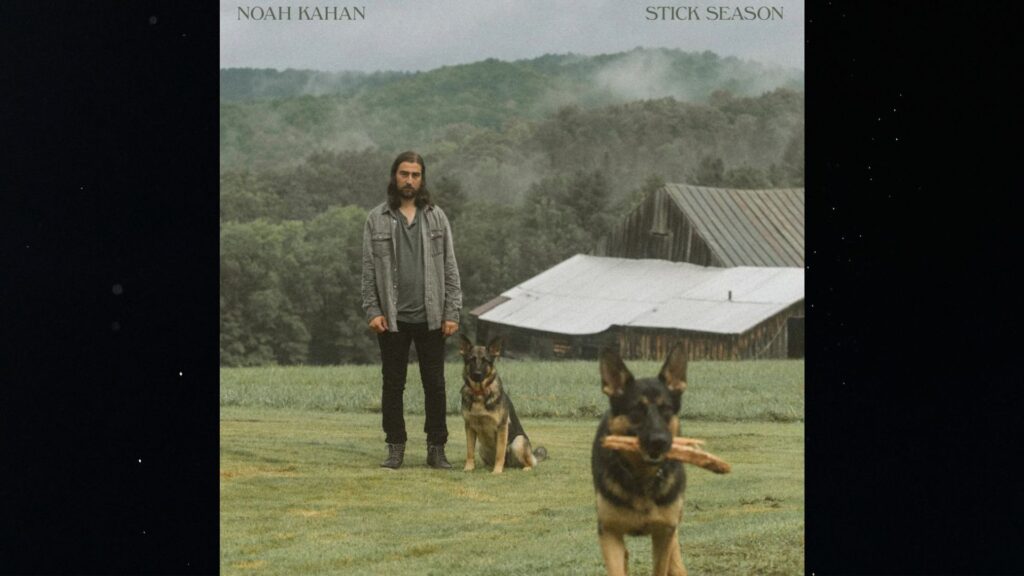More Than Two Years After Its Debut, Noah Kahan’s Stick Season Still Sticks
Last summer, Stick Season, a song by folk-pop artist Noah Kahan, became a staple in the newsroom after our adviser shared it with us.
I couldn’t see what was so special about the track, until I gave it a closer listen.
In the song, Kahan uses driving as a metaphor to illustrate how quickly things ended with a lover. Though they promised him forever, they missed his “exit sign,” “kept on drivin’ straight and left [their] future to the right.”
Left with unresolved anger, guilt and loneliness, Kahan channels his feelings into a catchy chorus that makes you feel like a passenger riding through the pain with him.
That vulnerability compelled me to listen to the entire Stick Season album. Eventually, I was walking into the newsroom every day with a new track to dissect.
Kahan—who grew up in Strafford, a town in Vermont, listening to artists like Paul Simon, Cat Stevens and The Lumineers—entered the music scene in 2017 with his single, Young Blood. He signed with Republic Records; the label is home to giants like Taylor Swift, James Bay and Ariana Grande.
Two years later, he released his first album, Busyhead, followed by I Was/I Am (2021). Both projects have a pop-indie vibe and touch on failed relationships, loneliness and mental health.
But it was Stick Season (2022) that introduced him to bigger audiences. According to an interview with Canadian broadcaster Tom Power, Kahan teased a snippet of the song on TikTok in 2020, but almost took it down because he didn’t see people liking it or commenting. When he woke up the next morning, the video had garnered thousands of likes, fueling Kahan to complete the song.
During the 14-track album, the 28-year-old returns to his folk roots. His lyrics explore emotions like love and depression, while also conveying nostalgia for his hometown.
The album’s name refers to a Vermont phrase that describes the transition between autumn and winter, characterized by barren trees, cold, gloomy weather and less daylight.
Several songs on the album have two parts: a beginning laced with Kahan’s soft vocals and guitar/mandolin, followed by an intense, sing-your-heart-out chorus, where he belts out raw emotions like sadness, frustration and yearning.
Tracks like All My Love and You’re Gonna Go Far, a song on the Forever edition, explore the idea of letting go of someone you love and wishing them the best.
Lyrics such as “you burrowed in under my skin, what I’d give to have you out from me,” contrasted with lyrics like “there ain’t a drop of bad blood,” allows listeners to visualize how attached Kahan still feels to his ex-lover.
In Homesick, Kahan paints a picture of a mundane, antiquated Strafford. Using exaggerated statements such as “I’m tired of dirt roads named after high school friends’ grandfathers” and “time moves so damn slow I swear I feel my organs failing,” Kahan conveys his desperation to leave. The song’s fast-pace, dominated by electric guitar and drums, is a stark contrast to the slowness of his hometown.
Kahan’s punchy lyrics climax in an angsty chorus that has you belting, “I would leave if only I could find a reason/I’m mean because I grew up in New England,” even if you’ve never stepped foot in Vermont. Though the track puts a play on the word ‘homesick,’ the song embodies pride for the place that made him who he is.
Other songs on the album highlight Kahan’s gift for storytelling.
Come Over invites listeners into Kahan’s isolation. The singer describes his home with human qualities—“the sad house on Balch Street” that “was designed to kinda look like it’s crying,” where “the eyes are the windows” and “the garage is the mouth”—that allow you to picture him living in sadness.
In the hook, he asks his lover to “come over” through a heartfelt wail, later adding “you don’t have to tell the other kids at school.” Kahan’s child-like plea for company speaks to the innocence and vulnerability in relationships.
Orange Juice tells the story of two friends who reunite after a deadly car accident. One friend left town, found God and got sober, while the other stayed.
Feelings of resentment and insecurity surface through verses like “but it made you a stranger/filled you with anger/now I’m third in the lineup/to your Lord and your Savior,” where Kahan’s voice seamlessly fluctuates between tenderness and restrained bitterness, demonstrating the control he has over it.
No Complaints and Growing Sideways zero-in on Kahan’s struggle with depression.
Using satirical descriptions, like a conversation with his “sad-eyed middle-aged” therapist about Jesus on his “overpriced new leather couch,” Kahan walks you through the frustration of therapy.
Graphic metaphors such as “keep the bad sh*t in my liver” (a reference to his dependence on alcohol) and “filled the hole in my head with prescription medication” allow you to understand Kahan’s suffering.
At its core, Stick Season is an ode to anyone going through grief, loneliness, heartbreak and mental health hardships.
Although his songs are packed with deeply specific details about New England and his struggles, Kahan’s specificity and transparency helps people feel seen.
His lyrics invite listeners to confront the parts of themselves they’re uncomfortable with, knowing they’re not alone.

